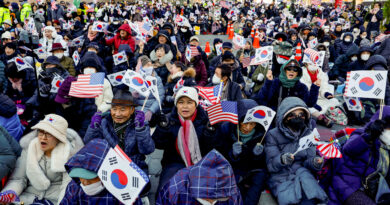Biden Holds Talks with Western Allies on Ukraine’s Future as Presidency Draws to a Close
President Joe Biden convenes with global leaders in Germany to strategize for the sustained backing of Ukraine.
President Joe Biden is rallying the European allies of the United States to continue their support for Ukraine as he prepares to step down from office in January.
Currently in Germany, Biden held discussions with German Chancellor Olaf Scholz, French President Emmanuel Macron, and UK Prime Minister Keir Starmer on October 18th. The agenda included Ukraine and the evolving conflict in the Middle East.
This meeting follows recent one-on-one talks between the group and Ukrainian President Volodymyr Zelenskyy, where he outlined his strategy for a victorious outcome in the ongoing battle with Russia.
White House national security adviser Jake Sullivan informed reporters on Air Force One on October 17th that Biden would collaborate with the three leaders to ensure consistent long-term support for Ukraine post his tenure.
This gathering also precedes the closely contested U.S. presidential election, which could bring significant alterations to U.S. foreign policy.
Vice President Kamala Harris, Democratic presidential nominee, advocates for maintaining the U.S.’s existing policy of providing security aid to Ukraine and using economic sanctions against Russia.
On the other hand, Republican presidential nominee and former President Donald Trump promises to end the conflict promptly and expresses concerns that its continuation could escalate into a world war involving Russia and the nuclear-powered nations supporting Ukraine.
Consequently, Washington’s NATO partners are demonstrating their commitment to bolstering Ukraine’s defense independently, with or without U.S. support.
“Our stance is clear: We are bolstering Ukraine to the best of our abilities,” Scholz highlighted. “Simultaneously, we are cautious not to involve NATO in the conflict to prevent it from spiraling into a larger catastrophe.
“We will support Ukraine for as long as it’s essential.”
Given the uncertainty surrounding future U.S. assistance to Ukraine and potentially NATO itself, the European members of the alliance are taking measures to ensure they can continue safeguarding Ukraine against the ongoing Russian invasion.
Likewise, the alliance is setting up an office for a NATO representative to be stationed in Kyiv, enhancing Ukraine’s institutional ties with the alliance.
Regarding the possibility of Trump trying to coerce Ukraine into accepting Russia’s terms, White House National Security Council spokesperson John Kirby informed reporters on October 18th that the Biden administration would strive to ensure a “fair peace” aligned with Zelenskyy’s desires.
“It’s crucial that any peace agreement needs to be acceptable to him [Zelenskyy] and the Ukrainian people, and we will not entertain any talks about Ukraine without involving Ukraine,” he affirmed.
Kirby added that Biden’s discussions with international leaders were not explicitly related to the upcoming U.S. elections but aimed at expressing gratitude for the allies’ ongoing support and engaging in substantial discussions about collective security.
In this context, Kirby stressed that reaffirming U.S. support for NATO and Ukraine as a prospective NATO member is critical for global security.
“American leadership holds significance for leaders here,” Kirby noted. “The United States’ role is crucial.
“NATO will play a role in Ukraine’s future. That much is certain. Our primary objective is to assist them in winning this war.”





